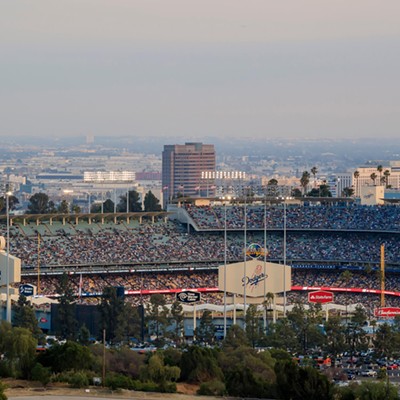It's pretty rare when you find somebody about whom nobody has a bad word to say. This was Ira Andrews.
When I once told a friend that I wanted to buy a new car, without hesitation he said, "Go see Ira. You'll never buy a car from another person."
Wow, I thought. This Ira must be something really special. Maybe he can sing like Dusty Springfield or perhaps he can explain Fermat's Last Theorem. It turns out that he was just the nicest guy I've ever met. Soft-spoken and pleasant, mellow and kind; just someone totally at peace with himself. It was really creepy.
He had on his desk a picture of himself as a teenager wearing a red Tucson High basketball uniform. He had been a star back in the day and it earned him a scholarship to Northern Arizona University. Somewhere along the line, as we chatted, he mentioned that he had attended the Dunbar School. I would later write a cover story for this paper about what it was like for black people to grow up in Tucson back in the days before the civil rights movement. He told me stories—without pain or anger in his voice—of ridiculous measures taken by local leaders to subjugate people based on their skin color.
Back in that time, after the end of World War II, black Tucsonans were at best second- (and more probably, third-) class citizens. The only public pool in town, at Oury Park, was used by Anglos and Latinos (in those days universally referred to as "Mexicans") on Mondays, Tuesdays and Wednesdays. Thursday was Negro Day, after which the pool was drained, scrubbed and rechlorinated for the exclusive use of Anglos over the three-day weekend.
Blacks had to sit in the balcony at the Fox Theatre and many restaurants (including Chinese and Mexican restaurants!) and stores in the downtown area were off-limits to African-Americans. But the height of the stupidity was the school situation. All black kids had to attend the Dunbar School through the ninth grade. The principal of the school was Morgan Maxwell, for whom a TUSD middle school on the far westside is named. After completing the ninth grade, Dunbar students were sent to Tucson High, which was integrated.
There were separate black homerooms, but the classes and sports teams were integrated and that was fine. Not everybody was fine with the Jim Crow insanity. Ira told me that everybody knew the story about the time that Tucson High went to the border town of Douglas for a football game. Tucson coach Rollin T. Gridley took his team to the historic Gadsden Hotel for a prearranged pregame meal. Tucson had one black player (Morgan Maxwell Jr.). Gridley was told by the hotel management that Maxwell would not be allowed to eat in the dining room with his teammates. Gridley had the players get up from their chairs, leave their meals behind and march out of the hotel. They went to a store, got some bologna and bread, made some sandwiches, and then proceeded to kick the crap out of the Douglas team.
Maxwell's best friend on the team, Frank Borman (who would go on to command the Apollo 8 mission that orbited the moon on Christmas Eve 1968) wrote in his autobiography that Gridley's act shaped his attitude on race for the rest of his life.
Ira was diagnosed with cancer a few years ago and he fought it with grace and quiet strength. He passed away on June 4 at the age of 74. At his funeral last week, a couple of his adult nieces did a funny bit about how he always made each of them feel that she was his favorite. He just had that way about him. They had a slideshow at the funeral and I couldn't help but smile when they got to the late '60s/early '70s. I had seen the picture before of Ira in the Tony Manero disco pants and the silk shirt. I told him that his perfectly coiffed, spherical Afro looked like the helmets worn by the storm troopers in Spaceballs.
I bought several cars from him over the years. I'd walk into the dealership and the salespeople would come sniffing around. (Needless to say, I don't look like a hot prospect; otherwise they would have come scurrying forward.) I'd tell them that I was there to see Ira. Their shoulders would slump. But there was no resentment; only admiration. I think they all wished that they could fake his sincerity.
He was so low-key in his approach, it got to the point where I would say, "Please Ira, let me buy this car from you!" To which he would respond, "Well, I'm not sure ... do you really need a new car?"
I'm told that, over an extended period, he was salesperson of the month and of the year more than everybody else on the staff combined. But that stuff didn't matter to him. He was just helping people.
During the funeral, when the preacher started preaching, my mind drifted and I had this vision of Ira helping angels get into the right chariots. I've been a Catholic all my life and I'll tell you what: There'd better be a heaven for people like Ira.
I miss him.







